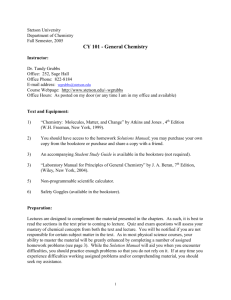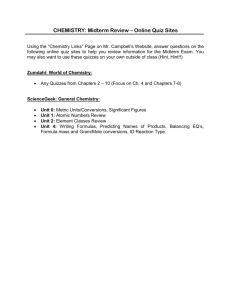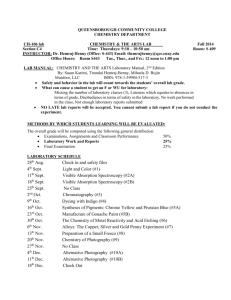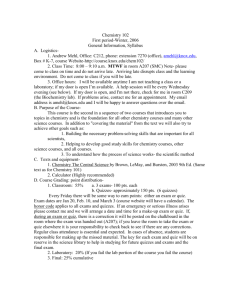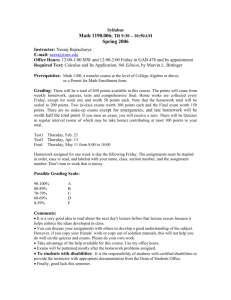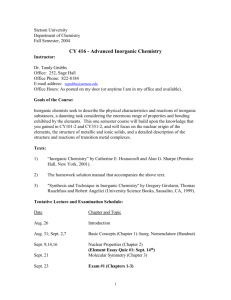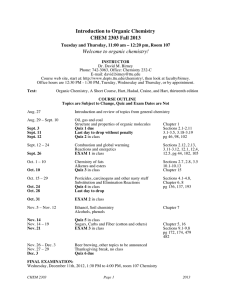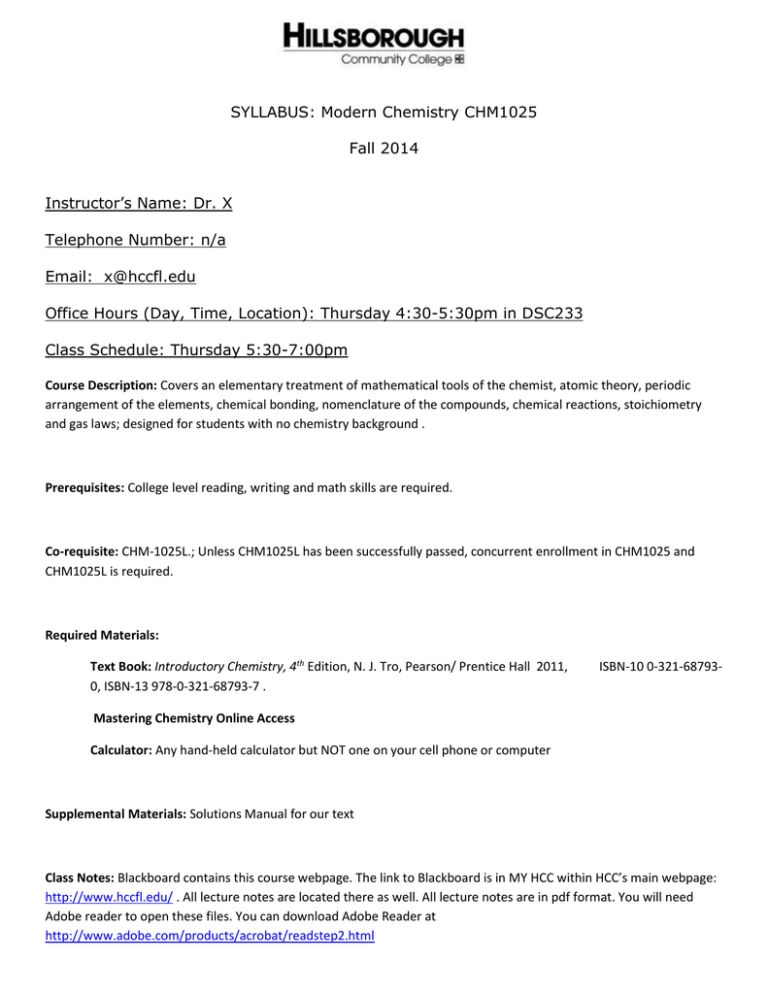
SYLLABUS: Modern Chemistry CHM1025
Fall 2014
Instructor’s Name: Dr. X
Telephone Number: n/a
Email: x@hccfl.edu
Office Hours (Day, Time, Location): Thursday 4:30-5:30pm in DSC233
Class Schedule: Thursday 5:30-7:00pm
Course Description: Covers an elementary treatment of mathematical tools of the chemist, atomic theory, periodic
arrangement of the elements, chemical bonding, nomenclature of the compounds, chemical reactions, stoichiometry
and gas laws; designed for students with no chemistry background .
Prerequisites: College level reading, writing and math skills are required.
Co-requisite: CHM-1025L.; Unless CHM1025L has been successfully passed, concurrent enrollment in CHM1025 and
CHM1025L is required.
Required Materials:
Text Book: Introductory Chemistry, 4th Edition, N. J. Tro, Pearson/ Prentice Hall 2011,
0, ISBN-13 978-0-321-68793-7 .
ISBN-10 0-321-68793-
Mastering Chemistry Online Access
Calculator: Any hand-held calculator but NOT one on your cell phone or computer
Supplemental Materials: Solutions Manual for our text
Class Notes: Blackboard contains this course webpage. The link to Blackboard is in MY HCC within HCC’s main webpage:
http://www.hccfl.edu/ . All lecture notes are located there as well. All lecture notes are in pdf format. You will need
Adobe reader to open these files. You can download Adobe Reader at
http://www.adobe.com/products/acrobat/readstep2.html
Grading Policy: The final grade for this course will be based upon the student’s performance on four pre-test quizzes, 3
class exams, on-line homework, and a final exam which collectively add up to 700 possible points. The final grade will be
determined according to the grading system described below.
Pre-test Quizzes: At least five (5) quizzes will be given throughout the semester and will be announced in class ahead of
time. Quizzes are free response and must show all the work for full credit. The highest four quizzes will make up 100
points towards the final grade. No make-up quizzes will be given.
Homework: Assignments for each chapter covered in class can be accessed online at
http://www.pearsonmylabandmastering.com An access code will be needed to register in Mastering Chemistry.
This code is included with new textbooks. If a used textbook was purchased instead, you may purchase an access code
online with or without an e-book at the same website.
Please wait to register until we cover that in class during the second week of classes because each class here has its
own code.
Your homework grade (# points completed / # points assigned) will make up 100 pts. of your final course grade.
Exams: Three one hour exams will be given this term and must be taken when scheduled. You will need a Scantron for
each exam. No make-up exams will be given. The four exams will make up 400 points towards the final grade. Please
see final exam policy for possible grade replacement.
Final Exam: The final exam is required. The final exam is scheduled on Thursdayday Dec 5, 2013 from 5:30 – 7:00 pm.
The final exam is cumulative and worth 100 points. The final exam grade can be used to replace a lower class exam
score.
Extra Credit:
1. There is an on-going opportunity for extra credit during the semester. These points will be added to your total points
for the term (not your final grade):
Daily pop quiz- 30 second quiz most class days at start of class (0.25 pt. if you take it, 0.5 pt. if you are
correct)
2. Within Mastering Chemistry I will put a review set of problems before each 1-hr. test. These points will be
added into your homework tally.
Grading System
Total 700 points
Percent
Grade
90-100%
A
80-89%
B
70-79%
C
60-69%
D
0-59%
F
Incomplete Grade: To be eligible for an “I,” students must have satisfactorily completed at least two-thirds of the course
requirements. “I” grades are given only when unforeseen circumstances that are verifiable and which prevent students
from completing course requirements during the regular term. An “I” contract is agreed upon and signed by both
students and instructors. Contracts include a list of the course requirements students must complete and the deadline
by which the work must be completed. “I” grades must be removed before the end of the eighth week of the following
term (excluding summer term) or they will be changed to “F” grades on the students’ permanent records.
Academic Integrity: Cheating and plagiarism (individual or in collaboration) are not permitted. Minimum penalty is a
zero on that assignment for the first incident. Removal from the course with a grade of F will occur for the second
incident. Refer to the Code of Student Conduct for HCC’s disciplinary actions.
Academic work submitted by students to their instructors is expected to be the result of their own thought, research or
self-expression. Moreover, when students borrow ideas, wording or organization from another source they are expected
to acknowledge that fact in the appropriate manner.
Attendance Policy: Students are required to attend class regularly and punctually. If students miss classes, regardless of
the cause, their opportunities for learning and academic success will be adversely affected.
Attendance will be taken at the beginning of every class meeting. A grade of WN will be assigned to students that do not
attend class during the first 10 calendar days. Students receiving financial aid are advised to discuss the impact of not
attending classes on their financial aid or veterans benefits.
Withdrawal Deadline: October 26, 2013. Please see me before withdrawing from this course.
Students with Disabilities: Any student whose disability falls within the American Disabilities Act (ADA) and requires
accommodations should contact the Office of Services for Students with Disabilities. The office is located in the Student
Service Building Room 204. You may also reach the office by phone at 259-6035.
Electronic Communications Devices: Cell phones must be turned off or in vibrate mode and put away
during class. Tablets/laptops can be used during class for our class purposes only.
The use of electronic communication devices during any examination is strictly prohibited. Academic Integrity
penalties will be enforced if electronic communication devices are used during an examination.
Recording of Lectures: Yes you can- but ask first! A student shall not, without the faculty member’s
express authorization, make or receive any recording, including but not limited to audio and video recordings of
any class, co-curricular meeting, organizational meeting or meeting with a faculty member. Further, the student
does not have permission to post class lectures or course lectures on the internet.
Course Outcomes: The student comprehends the basic concepts of general chemistry. In particular the student
Apply the steps of the scientific method and will be able to evaluate whether the steps of the
scientific method have been properly followed when given a description of an experiment.
Properly report measurements using the SI System, perform calculations, including unit
conversions, to the correct number of significant figures/digits and evaluate the precision and
accuracy of a group of measurements.
Describe the physical states of matter, classify matter and distinguish between physical and
chemical properties and changes including demonstrating knowledge of the property of density
by solving density problems and being able to interpret and apply their results (i.e. will an object
float, etc.).
Apply the Law of Conservation of Energy to calculate the amount of energy released or
absorbed in a chemical reaction or physical change and identify the change as endothermic or
exothermic.
Describe the structure of the atom including writing atomic and electron configuration notations
and relate the structure of the atom to the organization of the periodic table (groups and
periods) and be able to compute/calculate the average atomic mass for an element when
provided with the isotopic masses and percent abundances of the composite elemental
isotopes.
Write a chemical formula based on an IUPAC name, or to determine an IUPAC name based upon
a chemical formula, for inorganic compounds, use the formula to draw the Lewis structure for a
compound and predict the molecular geometry, as well as, to differentiate between ionic and
covalent bonding by evaluating the chemical formulas of compounds.
Solve mole relationship problems using the periodic table (mole conversions, percentage
composition, and empirical/molecular formulas, and molarity), balance chemical equations and
use balanced chemical equations to solve stoichiometry problems.
Disclaimer: Changes in this syllabus, homework, or schedule can be made at the discretion of the
professor and will be announced in class.
CHM1025 Tentative Schedule
Week
Week of
Thursday:
Tuesday
Thursday
1
Aug 21
Introduction & syllabus, Ch. 1
Ch.2
Remarks
2
Aug 28
Ch.2(online video and notes)
Ch. 2-3
No face-to-face
meeting
3
Sept 4
Ch. 3
Ch. 3
Quiz 1
4
Sept 11
Exam I (Ch. 1 - 3) Sept 10
Ch. 4
5
Sept 18
Ch. 4
Ch. 5
6
Sept 25
Ch. 5
Ch. 6
7
Oct 2
Ch. 6
Ch. 7
8
Oct 9
Exam II (Ch. 4-6) Oct 8
Ch. 7
9
Oct 16
Ch. 7-8
Ch. 8
Quiz 4
Ch. 9
Withdraw deadline
10/26
10
Oct 23
Ch. 8
Quiz 2
Quiz 3
Exam III (Ch. 7-8)
11
Oct 30
Oct 29
Ch. 9
12
Nov 6
Ch. 10
Ch. 10
Quiz 5
13
Nov 13
Ch. 10-11
Ch. 11
Quiz 6
Exam IV (Ch. 9-11) Nov 19
Review topics exam I &II
Lab practicals this
week
Review topics
No Class today!
14
15
Nov 20
Nov 27
exams III & IV
Happy Thanksgiving
Final Exam Thursday
Dec 4, 2014
16
Dec 4
5:30pm-7pm

